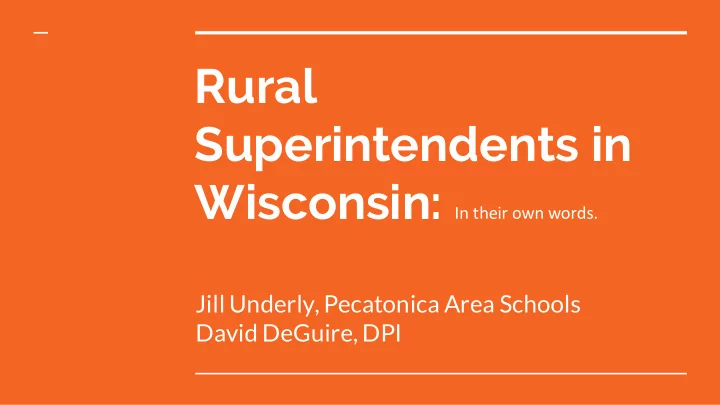

Rural Superintendents in Wisconsin: In their own words. Jill Underly, Pecatonica Area Schools David DeGuire, DPI
Background Curiosity about the experiences of rural Wisconsin superintendents drove this research and presentation. What do rural superintendents wish they knew when they started, what advice they’d give to someone starting out, and what types of needs they had for professional development? What can we expect? What does the data say about longevity and future shortages?
We love our jobs. How can we make it better for not just the kids, but for us too? About this 1. “Our Collective Experiences.” 2. Attempt to find trends in what we may or may not already notice or Presentation: know. 3. How can we make our profession stronger? 4. What can we do to recruit new superintendents? 5. What recommendations can we make for professional development, licensure/courses.
Statistics There are 421 School Districts in Wisconsin ➔ Unexpected This year, there are 72 districts with new superintendents. ➔ Emotional Why should we care? ➔ Simple 1/6th of school districts! What happens when you have administrative turnover? ➔ SHOULD WE BE CONCERNED?
A few takeaways: 1. Mentoring is important. Most indicated that having a mentor either in the building or at a neighboring school district is critical to success. 2. DPI Workshops are very important -they are also very timely. The “understanding the school levy” was cited by many respondents as the perfect example of professional development. 3. Networking is important, particularly among those who are new and among new superintendents. 4. Gender imbalance exists and there could be several reasons: a. Most rural superintendents promote from high school principals. There are few female high school principals statewide. -this is its own research question. b. Women who become superintendents often were “Directors” of Special Education or Curriculum (often found in larger districts).
FACT: Most superintendents in Wisconsin are 10 years away from retirement.
Just Because YOU work in a smaller district doesn’t mean you have a smaller workload. Respondents say they are also: 42% CI Directors 40% HR Directors 32% manage federal programs 26% Business Managers
Questions: What are we doing to encourage more women and men to enter our profession? What challenges do you foresee rural school districts encountering that we are not equipped to handle?
Who Encouraged You? ➔ 81% said a Superintendent or District Administrator ➔ 12 % said a School Board Member or Board President said they would be an excellent superintendent. ➔ What implication is there for us who are currently superintendents?
Classes that we wished we’d had in Superintendent School: ● Budgeting ● School Board Relationships ● HR/Employee Benefits/ Labor Law ● Instructional Leadership Question: ● “Practical” School Finance (like DPI ones) Is the Rural ● Community Building Superintendent a CEO ● of a Major Employer? Public Relations/Media Relations ● Facility Planning ● Strategic Planning ● Communication Plans/Social Media ● Equity Focused Leadership
Fact: Most Rural Superintendents started in administration as a high school principal.
What component of the job What were you were you most prepared for most prepared when you started your first superintendent position? for? Instructional Leadership ● Community Relationships ● Staff/Parent ● Communications Staff Supervision ● Grant Writing ●
What Makes it Worth It? (Hint: It’s about the kids…) Who Knew? The Kids ● 92% of us who took the Making a difference for Kids ● survey would go back Making a difference for rural and select this career ● path. communities, schools, and kids
Top 1st Yr. Challenges: ● Too much work. (Staff Supervision and School Board Management to start) Thoughts: ● Personnel Management School Board ● Board Micromanagement Orientation by the school’s attorney, or ● Turnover in prior years left WASB, but somehow “insist” or require they attend - could help with inconsistency and “messes.” expectations. ● Work-Life Balance/Guilt
What would make the job better? Mentoring/Training Professional Development Relevant, on-the-job Encouragement/less guilt with attending PD experiences; “internship.” events, national, regional, or local. Newer Sup’s Veteran Superintendents Better Contracts Other Benefits Equal compensation to Longer-term health suburban/urban peers; insurance benefit; pay off student loans. More Vacation Time
A few takeaways: 1. Mentoring is important. Most indicated that having a mentor either in the building or at a neighboring school district is critical to success. 2. DPI Workshops are very important -they are also very timely. The “understanding the school levy” was cited by many respondents as the perfect example of professional development. 3. Networking is important, particularly among those who are new and among new superintendents. 4. Gender imbalance exists and there could be several reasons: a. Most rural superintendents promote from high school principals. There are few female high school principals statewide. -this is its own research question. b. Women who become superintendents often were “Directors” of Special Education or Curriculum (often found in larger districts).
What Advice do you have? Build a network of peer Have a heart for kids and Know that your kids are superintendents that you lead with the students in going to grow up quick, so can trust in the area to mind. make sure you spend time communicate with to help with them at home in the Don’t be afraid to ask for not only in that first year evenings. Work-Life help if you do not have the but to work with into the Balance is KEY. answer. future.
Why is this information important?
Recommend
More recommend